- Clone
- 9F10 (See other available formats)
- Regulatory Status
- RUO
- Workshop
- V S215
- Other Names
- VLA-4 α chain, α4 integrin, Integrin α4 chain, ITGA4
- Isotype
- Mouse IgG1, κ
- Ave. Rating
- Submit a Review
- Product Citations
- publications
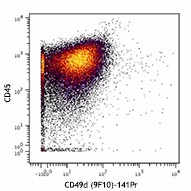
-

Human PBMCs stained with 154Sm-anti-CD45 (HI30) and 141Pr-anti-CD49D (9F10). Data provided by DVS Sciences.
CD49d is a 150 kD α integrin chain known as α4 integrin or VLA-4 α chain. It forms a heterodimer with either integrin β1 (α4β1, VLA-4) or β7 (α4β7). CD49d is expressed broadly on T lymphocytes, B lymphocytes, monocytes, thymocytes, eosinophils, basophils, mast cells, NK cells, dendritic cells, and some non-hematopoietic cells, but not on normal red blood cells, platelets or neutrophils. VLA-4 binds to VCAM-1 (CD106) and fibronectin. α4β7 is the receptor for VCAM-1 and MAdCAM-1. CD49d participates in mononuclear cell trafficking to endothelial sites of inflammation and has roles in cell-cell interactions and cell adhesion to extracellular matrices. CD49d is involved in lymphocyte migration, T cell activation, and hematopoietic stem cell differentiation. CD49d is a marker to isolate pure populations of Treg cells due to its absence on Foxp3+ cells.
Product DetailsProduct Details
- Verified Reactivity
- Human, Cynomolgus, Rhesus
- Reported Reactivity
- African Green, Baboon, Cat, Cow, Chimpanzee, Common Marmoset, Dog, Horse, Sheep, Squirrel Monkey
- Antibody Type
- Monoclonal
- Host Species
- Mouse
- Formulation
- Phosphate-buffered solution, pH 7.2, containing 0.09% sodium azide and EDTA.
- Preparation
- The antibody was purified by affinity chromatography.
- Concentration
- 1.0 mg/ml
- Storage & Handling
- The antibody solution should be stored undiluted between 2°C and 8°C.
- Application
-
FC - Quality tested
CyTOF® - Verified - Recommended Usage
-
This product is suitable for use with the Maxpar® Metal Labeling Kits. For metal labeling using Maxpar® Ready antibodies, proceed directly to the step to Partially Reduce the Antibody by adding 100 µl of Maxpar® Ready antibody to 100 µl of 4 mM TCEP-R in a 50 kDa filter and continue with the protocol. Always refer to the latest version of Maxpar® User Guide when conjugating Maxpar® Ready antibodies.
- Application Notes
-
Additional reported applications (for the relevant formats) include: immunohistochemical staining of acetone-fixed frozen tissue sections, and in vitro T cell costimulation2,3. The Ultra-LEAF™ Purified antibody (Endotoxin < 0.01 EU/µg, Azide-Free, 0.2 µm filtered) is recommended for functional assays (Cat. No. 304339 and 304340).
- Additional Product Notes
-
Maxpar® is a registered trademark of Standard BioTools Inc.
-
Application References
(PubMed link indicates BioLegend citation) -
- Schlossman S, et al. Eds. 1995. Leucocyte Typing V. Oxford University Press. New York.
- Jeong SH, et al. 2004. J. Virol. 78:6995. (Costim)
- Vogel TU, et al. 2002. J. Immunol. 169:4511. (Costim)
- Kleinewietfeld M, et al. 2009. Blood 113:827. (FC) PubMed
- Palacious F, et al. 2010. Blood 115:4488. PubMed
- Yoshino N, et al. 2000. Exp. Anim. (Tokyo) 49:97. (FC)
- Sestak K, et al. 2007. Vet. Immunol. Immunopathol. 119:21.
- Mattapallil MJ, et al. 2011. J. Immunol. 187:1977. PubMed
- Product Citations
-
- RRID
-
AB_2563755 (BioLegend Cat. No. 304319)
Antigen Details
- Structure
- Integrin, type I transmembrane glycoprotein, 150 kD.
- Distribution
-
T cells, B cells, NK , dendritic cells, thymocytes, monocytes, eosinophils, mast cells.
- Function
- Lymphocyte migration, T cell activation, stem cell differentiation.
- Ligand/Receptor
- Fibronectin, VCAM-1, MAdCAM-1
- Cell Type
- B cells, Dendritic cells, Eosinophils, Mast cells, Monocytes, NK cells, T cells, Thymocytes, Tregs
- Biology Area
- Cell Adhesion, Cell Biology, Immunology, Innate Immunity
- Molecular Family
- Adhesion Molecules, CD Molecules
- Antigen References
-
1. Elices M, Ed.1995. Springer Semin. Immunopathol. 16(4).
2. Lobb RR and Helmer ME. et al. 1994. J. Clin. Invest. 94:1722. - Gene ID
- 3676 View all products for this Gene ID
- UniProt
- View information about CD49d on UniProt.org
Related FAQs
- Can I obtain CyTOF data related to your Maxpar® Ready antibody clones?
-
We do not test our antibodies by mass cytometry or on a CyTOF machine in-house. The data displayed on our website is provided by Fluidigm®. Please contact Fluidigm® directly for additional data and further details.
- Can I use Maxpar® Ready format clones for flow cytometry staining?
-
We have not tested the Maxpar® Ready antibodies formulated in solution containing EDTA for flow cytometry staining. While it is likely that this will work in majority of the situations, it is best to use the non-EDTA formulated version of the same clone for flow cytometry testing. The presence of EDTA in some situations might negatively affect staining.
- I am having difficulty observing a signal after conjugating a metal tag to your Maxpar® antibody. Please help troubleshoot.
-
We only supply the antibody and not test that in house. Please contact Fluidigm® directly for troubleshooting advice: http://techsupport.fluidigm.com/
- Is there a difference between buffer formulations related to Maxpar® Ready and purified format antibodies?
-
The Maxpar® Ready format antibody clones are formulated in Phosphate-buffered solution, pH 7.2, containing 0.09% sodium azide and EDTA. The regular purified format clones are formulated in solution that does not contain any EDTA. Both formulations are however without any extra carrier proteins.
Other Formats
View All CD49d Reagents Request Custom ConjugationCompare Data Across All Formats
This data display is provided for general comparisons between formats.
Your actual data may vary due to variations in samples, target cells, instruments and their settings, staining conditions, and other factors.
If you need assistance with selecting the best format contact our expert technical support team.
-
APC anti-human CD49d
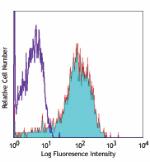
Human peripheral blood lymphocytes stained with 9F10 APC -
PE anti-human CD49d
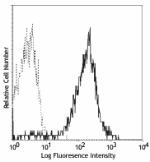
Human peripheral blood lymphocytes stained with 9F10 PE -
PE/Cyanine5 anti-human CD49d
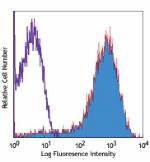
Human peripheral blood lymphocytes stained with 9F10 PE/Cyan... -
Purified anti-human CD49d
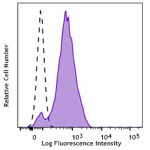
Human peripheral blood lymphocytes stained with CD49d (clone... -
Alexa Fluor® 594 anti-human CD49d
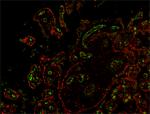
Human paraffin-embedded placenta tissue slice was stained wi... -
PerCP/Cyanine5.5 anti-human CD49d
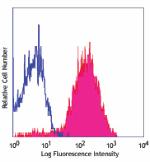
Human peripheral blood lymphocytes stained with 9F10 PerCP/C... -
PE/Cyanine7 anti-human CD49d
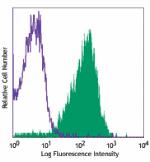
Human peripheral blood lymphocytes stained with 9F10 PE/Cyan... -
FITC anti-human CD49d
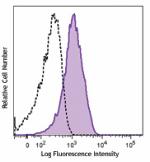
Human peripheral blood lymphocytes were stained with CD49d (... -
Brilliant Violet 510™ anti-human CD49d
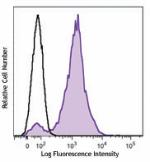
Human peripheral blood lymphocytes were stained with CD49d (... -
Brilliant Violet 421™ anti-human CD49d
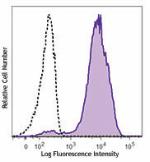
Human peripheral blood lymphocytes were stained with CD49d (... -
Purified anti-human CD49d (Maxpar® Ready)
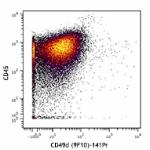
Human PBMCs stained with 154Sm-anti-CD45 (HI30) and 141Pr-an... -
Brilliant Violet 605™ anti-human CD49d
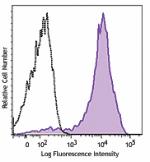
Human peripheral blood lymphocytes were stained with CD49d (... -
PE/Dazzle™ 594 anti-human CD49d
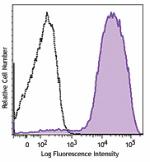
Human peripheral blood lymphocytes were stained with CD49d (... -
APC/Cyanine7 anti-human CD49d
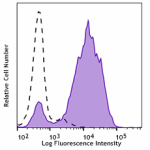
Human peripheral blood lymphocytes were stained with CD49d (... -
Brilliant Violet 711™ anti-human CD49d
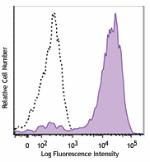
Human peripheral blood lymphocytes were stained with CD49d (... -
Alexa Fluor® 647 anti-human CD49d

Human peripheral blood lymphocytes were stained with CD49d (... -
Biotin anti-human CD49d
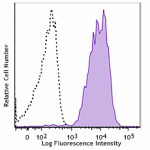
Human peripheral blood lymphocytes were stained with biotiny... -
TotalSeq™-A0576 anti-human CD49d
-
Brilliant Violet 785™ anti-human CD49d
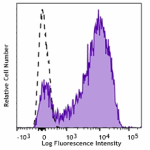
Human peripheral blood lymphocytes were stained with CD49d (... -
APC/Fire™ 750 anti-human CD49d
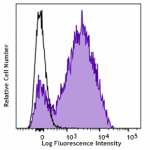
Human peripheral blood lymphocytes were stained with CD49d (... -
Ultra-LEAF™ Purified anti-human CD49d

Human peripheral blood lymphocytes stained with CD49d (clone... -
TotalSeq™-C0576 anti-human CD49d
-
TotalSeq™-B0576 anti-human CD49d Antibody
-
TotalSeq™-D0576 anti-human CD49d
-
APC/Fire™ 750 anti-human CD49d
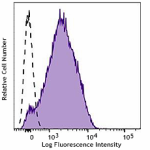
Typical results from human peripheral blood lymphocytes stai... -
Spark Red™ 718 anti-human CD49d (Flexi-Fluor™)
-
Spark Blue™ 574 anti-human CD49d (Flexi-Fluor™)
-
Spark Blue™ 550 anti-human CD49d (Flexi-Fluor™)
-
GMP APC/Fire™ 750 anti-human CD49d

Typical results from human peripheral blood lymphocytes stai...














Follow Us